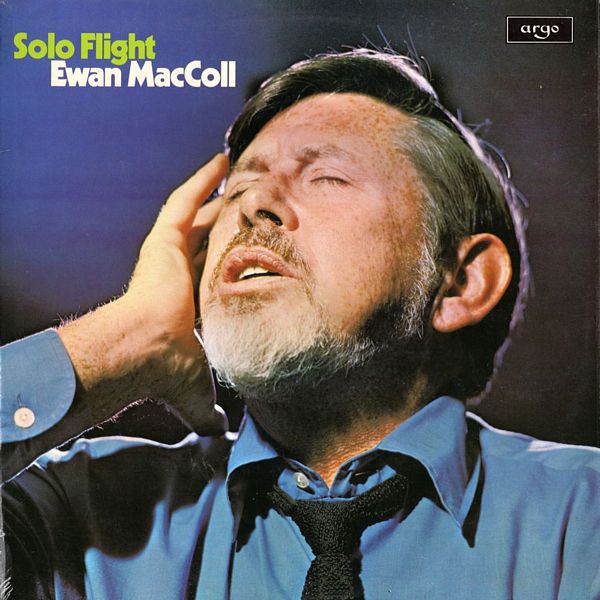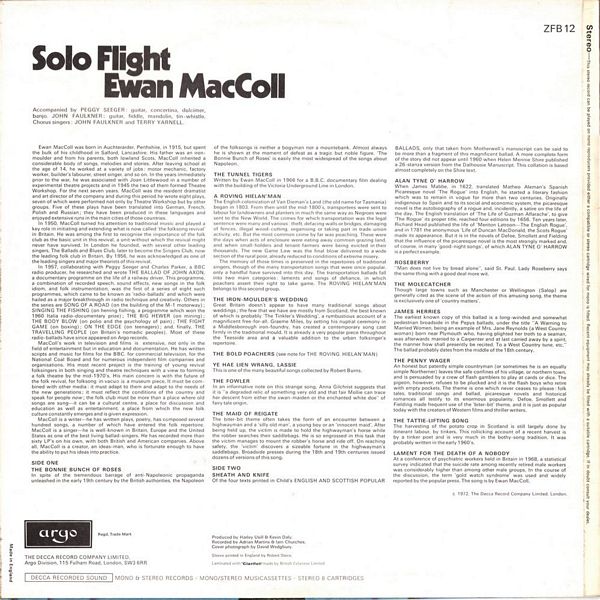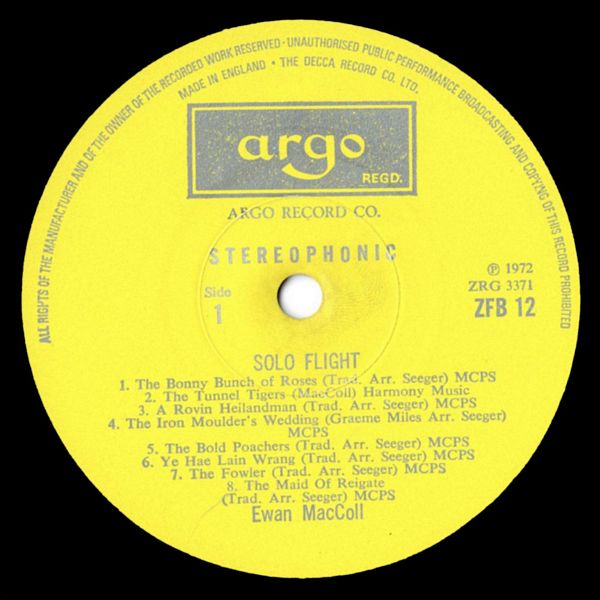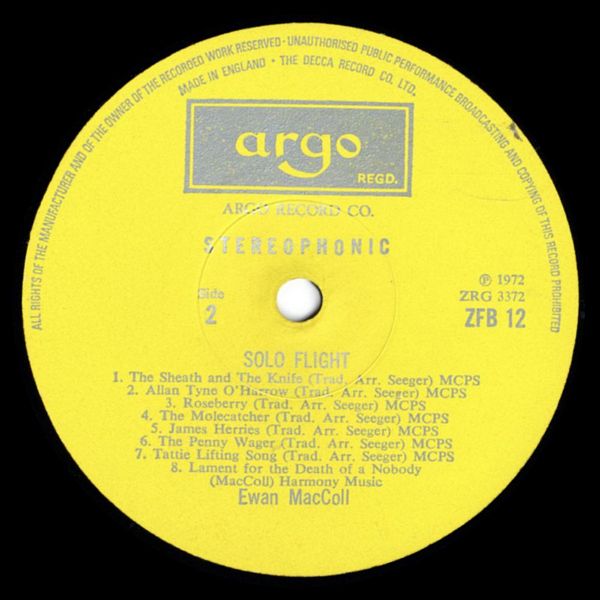

 |


 |
Sleeve Notes
Ewan MacColl was born in Auchterarder, Perthshire, in 1915, but spent the bulk of his childhood in Salford, Lancashire. His father was an iron-moulder and from his parents, both lowland Scots, MacColl inherited a considerable body of songs, melodies and stories. After leaving school at the age of 14, he worked at a variety of jobs: motor mechanic, factory worker, builder's labourer, street singer, and so on. In the years immediately prior to the war, he was associated with Joan Littlewood in a number of experimental theatre projects and in 1945 the two of them formed Theatre Workshop. For the next seven years, MacColl was the resident dramatist and art director of the company and during this period he wrote eight plays, seven of which were performed not only by Theatre Workshop but by other groups. Five of these plays have been translated into German, French, Polish and Russian; they have been produced in these languages and enjoyed extensive runs in the main cities of those countries.
In 1950, MacColl turned his attention to traditional music and played a key role in initiating and extending what is now called the folksong revival' in Britain. He was among the first to recognise the importance of the folk club as the basic unit in this revival, a unit without which the revival might never have survived. In London he founded, with several other leading singers, The Ballads and Blues Club, later to become the Singers Club, now the leading folk club in Britain. By 1956, he was acknowledged as one of the leading singers and major theorists of this revival.
In 1957, collaborating with Peggy Seeger and Charles Parker, a BBC radio producer, he researched and wrote THE BALLAD OF JOHN AXON, a documentary programme on the life of a railway driver. This programme, a combination of recorded speech, sound effects, new songs in the folk idiom, and folk instrumentation, was the first of a series of eight such programmes, which came to be known as 'radio-ballads' and which were hailed as a major breakthrough in radio technique and creativity. Others in the series are SONG OF A ROAD (on the building of the M-1 motorway); SINGING THE FISHING (on herring fishing, a programme which won the 1960 Italia radio-documentary prize); THE BIG HEWER (on mining); THE BODY BLOW (on polio and the psychology of pain); THE FIGHT GAME (on boxing); ON THE EDGE (on teenagers); and, finally, THE TRAVELLING PEOPLE (on Britain's nomadic peoples). Most of these radio-ballads have since appeared on Argo records.
MacColl's work in television and films is extensive, not only in the field of entertainment but in education and documentation. He has written scripts and music for films for the BBC, for commercial television, for the National Coal Board and for numerous independent film companies and organisations. His most recent project is the training of young revival folksingers in both singing and theatre techniques with a view to forming a folk theatre by the mid-1970's. His main concern is with the future of the folk revival, for folksong in vacuo is a museum piece. It must be combined with other media: it must adapt to them and adapt to the needs of the new generations; it must reflect the conditions of the country and speak for people now, the folk club must be more than a place where old songs are sung — it can be a cultural centre, a place for discussion and education as well as entertainment, a place from which the new folk culture constantly emerges and is given expression.
MacColl is a writer — he has written plays, poetry, has composed several hundred songs, a number of which have entered the folk repertoire. MacColl is a singer — he is well-known in Britain, Europe and the United States as one of the best living ballad-singers. He has recorded more than sixty LP's on his own, with both British and American companies. Above all, MacColl is a creator, an ideas-man, who is fortunate enough to have the ability to put his ideas into practice.
THE BONNIE BUNCH OF ROSES — In spite of the tremendous barrage of anti-Napoleonic propaganda unleashed in the early 19th century by the British authorities, the Napoleon of the folksongs is neither a bogyman nor a mountebank. Almost always he is shown at the moment of defeat as a tragic but noble figure. 'The Bonnie Bunch of Roses' is easily the most widespread of the songs about Napoleon.
THE TUNNEL TIGERS — Written by Ewan MacColl in 1966 for a B.B.C. documentary film dealing with the building of the Victoria Underground Line in London.
A ROVING HIELAN' MAN — The English colonization of Van Dieman's Land (the old name for Tasmania) began in 1803. From then until the mid-1800's, transportees were sent to labour for landowners and planters in much the same way as Negroes were sent to the Now World. The crimes for which transportation was the legal sentence were many and various theft, defacing walls or bridges, damaging of fences, illegal wood cutting, organising or taking part in trade-union activity, etc. But the most common crime by far was poaching. These were the days when acts of enclosure were eating away common grazing land, and when small holders and tenant farmers were being evicted in their thousands. The new Game Law was the final blow delivered to a wide section of the rural poor, already reduced to conditions of extreme misery.
The memory of those times is preserved in the repertoires of traditional singers, though of the many transportation songs that were once popular, only a handful have survived into this day. The transportation ballads fall into two main categories: laments and songs of defiance, in which poachers assert their right to take game. The ROVING HIELAN' MAN belongs to this second group.
THE IRON-MOULDER'S WEDDING — Great Britain doesn't appear to have many traditional songs about weddings; the few that we have are mostly from Scotland, the best known of which is probably 'The Tinker's Wedding', a rumbustious account of a magnificent free-for-all. Graeme Miles, by setting his nuptial ceremony in a Middlesborough iron-foundry, has created a contemporary song cast firmly in the traditional mold. It is already a very popular piece throughout the Teesside area and a valuable addition to the urban folksinger's repertoire.
THE BOLD POACHERS (see note for THE ROVING HIELAN' MAN)
YE HAE LIEN WRANG, LASSIE — This is one of the many beautiful songs collected by Robert Burns.
THE FOWLER — In an informative note on this strange song, Anna Gilchrist suggests that it is "a degraded relic of something very old and that fair Mollie can trace her descent from either the swan-maiden or the enchanted white doe'' of fairy tale origin.
THE MAID OF REIGATE — The biter-bit theme often takes the form of an encounter between a highwayman and a 'silly old man', a young boy or an 'innocent maid'. After being held up, the victim is made to hold the highwayman's horse while the robber searches their saddlebags. He is so engrossed in this task that the victim manages to mount the robber's horse and ride off. On reaching safety, the 'victim' discovers a sizeable fortune in the highwayman's saddlebags. Broadside presses during the 18th and 19th centuries issued dozens of versions of this song.
SHEATH AND KNIFE — Of the four texts printed in Child's ENGLISH AND SCOTTISH POPULAR BALLADS, only that taken from Motherwell's manuscript can be said to be more than a fragment of this magnificent ballad. A more complete form of the story did not appear until 1 960 when Helen Mennie Shire published a 26-stanza version from the Dalhousie Manuscript. This collation is based almost completely on the Shire text.
ALAN TYNE O' HARROW — When James Mabbe, in 1622, translated Matheo Aleman's Spanish Picaresque novel 'The Rogue' into English, he started a literary fashion which was to remain in vogue for more than two centuries. Originally indigenous to Spain and to its social and economic system, the picaresque novel is the autobiography of a rogue and, incidentally, a satire on the life of the day. The English translation of 'The Life of Guzman Alfarache', to give The Rogue' its proper title, reached four editions by 1656. Ten years later, Richard Head published the life of 'Meriton Latroon — The English Rogue', and in 1 781 the anonymous 'Life of Duncan MacDonald, the Scots Rogue' made its appearance. But it is in the novels of Defoe, Smollett and Fielding that the influence of the picaresque novel is the most strongly marked and, of course, in many 'good-night songs', of which ALAN TYNE O' HARROW is a perfect example.
ROSEBERRY — "Man does not live by bread alone'', said St. Paul. Lady Roseberry says the same thing with a good deal more wit.
THE MOLECATCHER — Though large towns such as Manchester or Wellington (Salop) are generally cited as the scene of the action of this amusing song, the theme is exclusively one of 'country matters'.
JAMES HERRIES — The earliest known copy of this ballad is a long-winded and somewhat pedestrian broadside in the Pepys ballads, under the title ''A Warning to Married Women, being an example of Mrs. Jane Reynolds (a West Country woman) born near Plymouth who, having plighted her troth to a seaman, was afterwards married to a Carpenter and at last carried away by a spirit, the manner how shall presently be recited. To a West Country tune, etc.'' The ballad probably dates from the middle of the 18th century.
THE PENNY WAGER — An honest but patently simple countryman (or sometimes he is an equally simple Northerner) leaves the safe confines of his village, or northern town, and is persuaded by a crew of flash gamblers to play at cards or dice. The pigeon, however, refuses to be plucked and it is the flash boys who retire with empty pockets. The theme is one which never ceases to please: folk tales, traditional songs and ballad, picaresque novels and historical romances all testify to its enormous popularity. Defoe, Smollett and Fielding made frequent use of the 'biter-bit' theme, and it is just as popular today with the creators of Western films and thriller writers.
THE TATTIE-LIFTING SONG — The harvesting of the potato crop in Scotland is still largely done by itinerant labour, by tinkers. This rollicking account of a recent harvest is by a tinker poet and is very much in the bothy-song tradition. It was probably written in the early 1960's.
LAMENT FOR THE DEATH OF A NOBODY — At a conference of psychiatric workers held in Britain in 1968, a statistical survey indicated that the suicide rate among recently retired male workers was considerably higher than among other male groups. In the course of the discussion, the term 'gold watch syndrome' was used and widely reported by the popular press. The song is by Ewan MacColl.